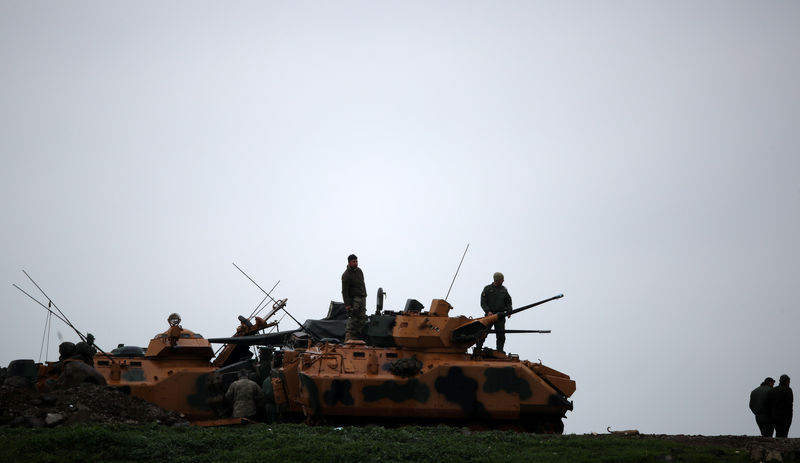By William Schomberg
LONDON (Reuters) - Ten years after China helped stave off the threat of a global depression with a huge stimulus plan, investors are looking once again toward Beijing as the world economy heads for a slowdown, or worse, in 2019.
Booming China has accounted for about a third of the growth in the global economy in recent years.
So recent signs that it is losing momentum is unsettling when the U.S. boom, turbo-charged by President Donald Trump's tax cuts of 2017, seems to have peaked and Europe's heavyweights are stalling.
China's slowdown is already being felt around the world, from Apple's profit warning due to weaker sales of its iPhones to carmaker Jaguar Land Rover laying off workers, after a 22 percent fall in sales in the country in 2018.
Policy sources told Reuters in Beijing on Friday that the government is planning a lower economic growth target of 6-6.5 percent for 2019 after an expected 6.6 percent in 2018, which would be the slowest expansion since 1990.
In the first few days of 2019, China raised infrastructure spending with a $34 billion railway investment and its central bank loosened the screws on banks to encourage them lend more, its fifth such move in a year.
"China, that’s what worries me most," Joachim Fels, managing director and global economic advisor at bond giant Pacific Investment Management Company, said as he surveyed the outlook for the world economy in 2019.
As well as cutting China's appetite for imports, a deeper slowdown could weaken its yuan currency and fan the flames of the trade war between Beijing and Washington.
However, Fels said his recession models for 2019 were flashing only orange warnings -- not red -- in part because the U.S. Federal Reserve was likely to pause its run of interest rate hikes after one or two more increases.
China is expected to do more to act to help its economy too, although officials in Beijing say they do not plan a stimulus of the magnitude of the nearly $600 billion package unleashed in 2008, shortly after the collapse of Lehman Brothers.
"I find it hard to look at it historically and bet against the Chinese authorities managing to stabilize their economy," Jim McCormick (NYSE:MKC), global head of desk strategy for RBS (LON:RBS) division NatWest Markets, said.
"When China wants to stabilize its economy, they tend to be successful."
In November, the Organisation for Economic Co-operation and Development trimmed its forecasts for Chinese growth to 6.3 percent in 2019 followed by 6.0 percent in 2020.
Since then, the impact of U.S.-China trade tensions have become more apparent, OECD senior economist Margit Molnar said, suggesting the forecasts could be lowered again.
Higher borrowing by local governments in China suggested a pick-up in infrastructure spending was coming, she said, potentially helping to offset signs of fragile confidence among Chinese consumers.
"The major issue is to guarantee a gradual slowing," Molnar said.
INVESTORS BREATH EASIER, FOR NOW
For the time being, the concerns of investors in late 2018 about the global economy have eased, leading to a tentative recovery in battered stock markets.
A round of talks between U.S. and Chinese trade officials in Beijing did not end in acrimony.
And in Europe, a slowdown is probably in part due to one-off factors such as new pollution rules for carmakers and the impact of the 'gilets jaunes' protests in France which has been felt in the supply chains that stretch across the border into Germany.
Steven Bell, chief economist with BMO Global Asset Management, said surveys of purchasing managers in the private sector around the world suggested a broad pick-up in industrial production was not far off.
And for many consumers in rich economies, low inflation and gradually rising wages will help their spending power.
But even if the world economy avoids a painful slowdown this year, it faces daunting fundamental challenges.
Many countries seem stuck in a rut of slow productivity growth which puts a brake on earnings and has propelled the rise of populist politics, from Trump to the protests in France.
In Britain, the radical left-wing leadership of Britain's opposition Labour Party is worrying investors after Prime Minister Theresa May split her Conservative Party with her plan to ease Britain out of the European Union at the end of March.
Gabriel Sterne, head of global macro research at Oxford Economics, said the pressure on politicians to heed the frustration of voters after years of austerity could help end an overly tight squeeze on public spending by some governments.
"By contrast, a worst-case scenario is one in which frustrated politicians launch hasty attacks or takeovers of key institutions, compromising central bank independence and launching unsustainable fiscal expansions," he said.

"Afflicted advanced-economy assets could even behave as if in an emerging market crisis."